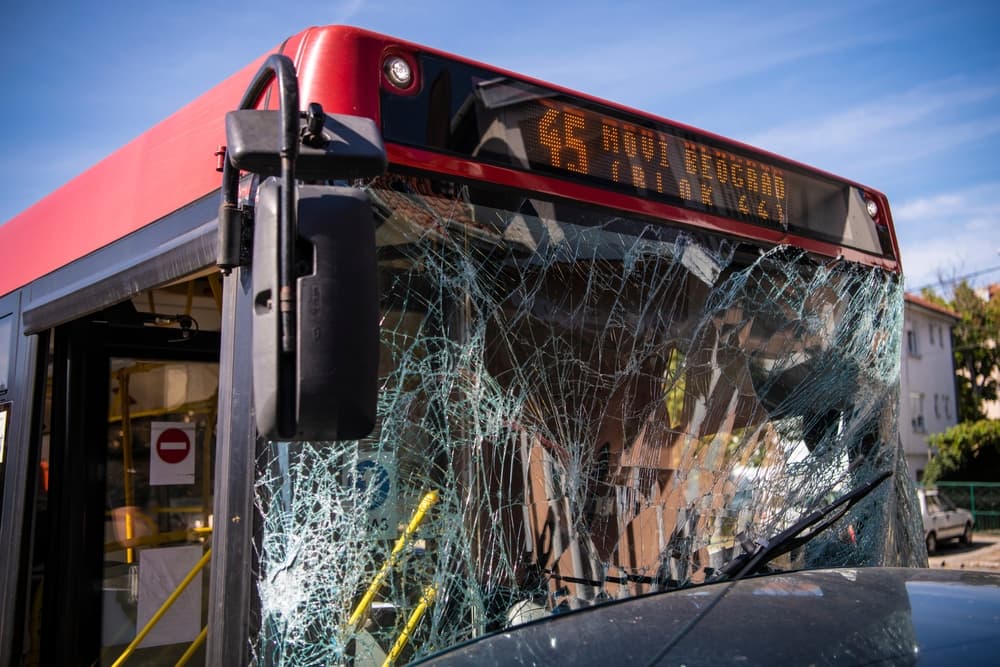Public transportation is a must for many Atlanta residents. The traffic congestion alone is enough to discourage you from getting behind the wheel.
Taking a bus is an easy and economical solution for many. If you have children, the school bus is also a big part of your life. We trust public buses with our safety without a second thought, but there are accident risks.
Buses are massive vehicles that can cause a lot of harm. Recovering from a bus accident is a long, painful, and expensive process that victims should not need to pay for.
Georgia residents may file a claim for compensation to cover the costs of an accident. Navigating the legal system is tricky, however.
You need a lawyer to prepare to build a strong case and defend your rights. Consulting an Atlanta bus accident lawyer gives you the best chance to get a fair settlement without legal knowledge or experience.
Types of Compensation in an Atlanta Bus Accident

In a bus accident, medical treatment costs can quickly overwhelm you.
Recovering compensation can help put your life back together.
Here are some common damages recovered in Georgia bus accidents:
- Current and future medical expenses
- Lost wages from time taken off work
- Property damage
- Pain and suffering
- Loss of future earning ability
- Loss of support or enjoyment of life
Calculate these damages to find a dollar amount to include in your claim. A skilled bus accident lawyer can file your claim correctly and on time.
The damages you claim may depend on the type of bus involved. Bus accidents sometimes involve several entities, unlike most car accidents where the only at-fault person is the other driver.
Dealing with a bus accident is tough, but understanding your rights and potential compensation can make it easier. Consult a personal injury attorney with experience in bus accidents to guide you through the legal process, advocate for your rights, and ensure fair compensation.
Atlanta’s Bus System
In Atlanta, commuters rely on the city’s rail system, MARTA, or the Metropolitan Atlanta Rapid Transit Authority, to travel the city. It uses buses, trains, and streetcars to ferry thousands of passengers daily.
MARTA encompasses a network of 48 miles of track and serves 38 train stations spanning Atlanta and its surrounding regions.
The average ridership for MARTA is more than 430,000 people per day. Other buses in Atlanta include charter buses, city buses, tour buses, school buses, and bus companies such as Greyhound and MegaBus.
All bus passengers in Georgia have the right to expect the bus operator to behave with a reasonable degree of care.
Bus companies must ensure their buses are safe by properly maintaining them and training their drivers. If they don’t, it can lead to avoidable accidents.
Liability in School Bus Accidents
School buses have special considerations as common carriers, so drivers and mechanics must follow strict rules from the Federal Motor Carrier Safety Administration (FMCSA) and the state. They also have a responsibility to ensure they safely transport kids and maintain the safety of other people on the road.
People who you could hold responsible for damages in a bus accident include the bus driver, the bus owner, the maintenance workers, and even the company that made the bus. If the accident happens because of a manufacturer error, it’s likely their fault.
Bus drivers also must have specific licenses and can only work for certain hours. If a driver breaks these rules or their boss doesn’t stop it, they’re not doing their job right. In that case, you might be able to file a claim for damages.
Why Don’t Buses Have Seat Belts?
We’re used to wearing seat belts in cars and most other modes of transportation. But why don’t public buses or school buses have them?
The National Highway Traffic Safety Administration (NHTSA) doesn’t make it a rule for buses over 10,000 pounds, although federal law does say lighter buses must have seat belts.
Eight states—Arkansas, California, Florida, Louisiana, Nevada, New Jersey, New York, and Texas—now make it mandatory for school buses to have seat belts.
Kids are kept safe in school buses by compartmentalization, where the seats act like protective pods during crashes. The cost of adding seat belts is considered too high for public buses, especially since the risk for passengers is relatively low without them.
Who Is at Fault in an Atlanta Bus Accident?
School bus and public transport passengers may have difficulty determining liability after an accident if multiple parties share blame for a bus crash, such as:
- The bus driver, if they fell asleep at the wheel or are under the influence.
- The bus company, if they didn’t maintain the bus adequately or didn’t meet safety standards. In Atlanta, where MARTA operates public transportation, you need a lawyer to investigate their operations.
- The bus manufacturer, if defective parts or malfunctions cause the crash. An attorney may locate expert witnesses to testify about faulty components in a bus.
The car or truck driver may also cause the accident and you could hold them liable for injuries to bus passengers.
The Statute of Limitations on Bus Accident Claims in Georgia
Contact a lawyer quickly because the statute of limitations for filing a bus accident claim in Georgia is two years or less:
- Six months after an accident involving an official vehicle
- One year after an accident involving a state vehicle
- Two years under other circumstances
This is only a general statute of limitations. Certain factors surrounding your bus accident can allow for substantially less time.
Act as soon as possible. Don’t go through this process alone, while treating your injuries. A dedicated Georgia bus accident lawyer will assist you through every step.
How Is Pain and Suffering Calculated in a Bus Accident?

There are two main categories of damages: economic or special and non-economic or general.
Special damages include quickly calculable losses like medical bills and lost income, while general damages encompass intangible aspects such as pain, suffering, emotional distress, and anxiety resulting from the accident.
Negotiating a personal injury settlement is challenging, especially when valuing pain and suffering. Insurance adjusters and lawyers use two common methods to calculate these damages and offer insights on navigating this terrain.
Multiplier method: This approach involves adding all special damages and multiplying them. The multiplier depends on case-specific factors such as injury severity, recovery prospects, impact on daily life, and fault. It is commonly used in negotiations, with the chosen multiplier often a point of contention.
Per diem method: This method uses a specific dollar amount for each day of pain. Justified by comparing the daily rate to the effort of going to work, it is suitable for temporary injuries with a clear daily impact.
If these methods sound complicated, they are. This is only a guide. Only a lawyer can help you with the current factors. Get professional guidance for cases involving permanent or long-term injuries.
Using both methods and adjusting
Using both methods and adjusting them based on the details of the accident is a strategic move. If your case is strong, start negotiating at a higher amount.. Since each case differs, begin negotiations with a reasonable number supported by evidence.
Evidence of pain in medical records
Discuss your pain with healthcare professionals when claiming damages—it helps insurers understand your case. Sharing these details during treatment proves that insurance companies are more likely to acknowledge them.
Collaborate closely with a lawyer to build a strong case, leveraging medical records to substantiate and strengthen your claims. When you work together effectively, it ensures you make a strong case for the compensation you deserve.
Clear communication and solid legal support are significant in your personal injury claim. Dealing with pain and suffering in settlements requires using effective methods, thinking about the specifics of your case, and showing solid proof.
If you get the hang of these things, you’ll be in an excellent position to get fair compensation. If it seems a little over your head, you’re not alone. Hire a lawyer with experience in bus accidents. They understand how the system works and all the most efficient ways to get the job done.
How to Strengthen Your Bus Accident Claim
You need comprehensive information to build a robust insurance claim. Gather as much evidence as possible to establish the party at fault, delineate their negligent behavior, and outline the injuries, property damage, or other losses resulting from their negligence.
After a bus accident, immediately contact a bus accident lawyer—they know how to build a strong case.
To boost your chances in the meantime:
- Notify police about the accident.
- Take pictures of the scene, your injuries, and any damage.
- Talk to witnesses. Get their contact info and statement.
- See a doctor for your injuries and keep track of your bills.
- Keep a record of any work you miss because of the accident.
A good bus accident attorney can help you get the best financial recovery for your claim.
What Can a Lawyer Do in a Bus Accident Case in Georgia?
After a bus accident, get the right help from a bus accident lawyer. A lawyer guides you through the legal process, ensuring your claim is filed correctly and gathering the necessary evidence.
They support you, advocating for your rights and representing you in court if things get tough.
But that’s not all.
- Proper claim filing: A lawyer files the victim’s claim accurately, navigating through Georgia processes and rules for personal injury claims.
- Evidence gathering: Legal professionals take charge of the evidence-gathering process, obtaining crucial documents like police reports and traffic camera footage to support the victim’s case.
- Corroborating evidence presentation: Lawyers identify and prepare supporting evidence, such as witness testimony, to strengthen the victim’s case.
- Advocacy: Attorneys advocate for the victim, using legal acumen to persuasively argue the case and, if necessary, threaten legal action for a fair resolution.
- Court representation: In case of failed negotiations, lawyers can take it to court. Their comprehensive legal knowledge and strategic approach are instrumental in presenting a compelling case before a judge.
A lawyer doesn’t just handle legal steps for a bus accident victim; they also provide caring support, gather evidence carefully, make convincing arguments, and, if necessary, take strong legal action. This commitment ensures that justice is pursued, letting the victim concentrate on healing and moving forward with their life.
The legal team at Atlanta Personal Injury Law Group is dedicated to ensuring that our clients can access top-notch legal representation to secure the compensation they rightfully deserve.
A life-altering accident can occur in the blink of an eye, resulting in catastrophic injuries that call for immediate medical treatment. Besides the extensive medical costs, you may be out of work, and need on-going care.
Our Atlanta personal injury attorneys will meet with you to provide a compassionate explanation of your rights and the available avenues for pursuing compensation. Over the years, we have successfully secured millions of dollars in settlements and verdicts on behalf of our injured clients. Let us help you next.
Call our Atlanta headquarters at (833) 285-9467 to discuss your next move.




























